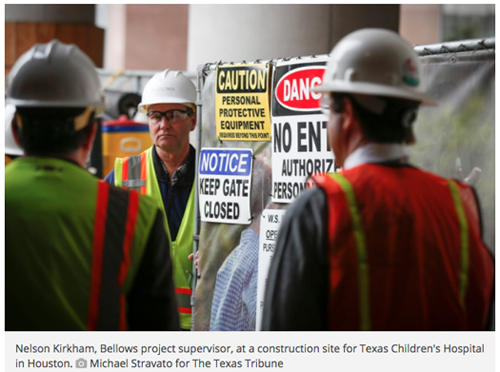 Two markedly different approaches to addressing workforce challenges are now featured in
Two markedly different approaches to addressing workforce challenges are now featured in
Texas Tribune, a statewide nonprofit news organization. Reporter Neena Satija took an in-depth look at both the Construction Career Collaborative, or C3, in Houston as well as the Workers Defense Project in Austin.
Workers Defense has earned significant mainstream media coverage in Austin and nationally – in fact, the New York Times called it “a union in spirit” – likely because it is often controversial and is seen by many as adversarial with business. C3 has been covered extensively by Construction Citizen but has seen less coverage in venues like the Houston Chronicle, for example.
The story in the Tribune says Workers Defense seems to have “more teeth” than C3 and notes the advocacy group has often partnered with government to help achieve its goals:
A few months ago, the Workers Defense Fund convinced the Austin City Council to tie participation in the Better Builder program to the ability to get fast-tracked construction permits from the city.
The pushback from the construction industry on that new policy, slated to start next year, was “relentless,” said Bo Delp, director of the Better Builder program. But he pointed out that receiving an expedited permit from the city could cut the costs of a construction project by as much as 5 percent and that implementing the Better Builder standards would add just 1 percent to a project’s costs.
Delp is correct that opposition to Worker’s Defense from business has been fierce.
As Construction Citizen reported when the Austin City Council took action, the Central Texas Chapter of ABC said they were “deeply concerned about the current direction of suggested reforms to the City’s building permitting process.”
“Our membership of over 150 companies has consistently employed thousands of local, skilled workers over 40 years of existence,” wrote David Smith, ABC's Board Chairman for the Austin area. “ABC and its contractor members maintain an exceptional commitment to the best in class safety measures, and actively support the application of public policy that promotes responsible behavior by and great outcomes for workers, private industry, public entities, and the larger community.”
The criticism did not end there.
President and CEO of the Austin Chapter of the Associated General Contractors Phil Thoden called the proposals “misguided.” In the days before the vote, Thoden sent an email to contractors, saying “It simply forces permit applicants to choose between the current, slow process or pay to hire a local workforce monitor and pass those costs along to the building's end users.”
“This proposal does not encourage the hiring of workers trained at the Austin Independent School District, the Austin Community College, Goodwill and other local entities,” Thoden wrote. “Rather, it focuses on DOL-certified apprentice program trainees for hiring goals.”
Rebecca Melançon, Executive Director of the Austin Independent Business Alliance testified before the city council that her group of more than 800 local employers supports construction workers’ rights but objects to coupling an expedited permit process with these additional requirements.
The Texas Tribune article points out that the evolution of the Construction Career Collaborative has been quite different. Satija's story suggests a private sector solution such as C3 is likely the most immediate way for there to be a change in the construction industry across Texas and possibly the nation:
Government seems unlikely to step in with a solution. Laws protecting the construction workforce, especially unskilled laborers — people without a licensed trade, who may go from working on roofs one day to installing floors or painting walls the next — are scarce, and there is little money or political will for enforcement.
At the same time, the country’s immigration system also does not appear destined for a quick and easy fix. And if President-elect Donald Trump makes good on his promise to deport millions of undocumented immigrants, that would cripple the construction industry even more, its leaders agree.
So C3’s founders hope that they can spur industry leaders to participate in the change themselves. They aim to create a certification that could ultimately be good for a company’s brand — like the “LEED” label that signifies that a building is using water and energy as efficiently as possible — declaring that a building has been constructed with safe and well-paid labor, whatever the immigration status of its workers may have been.
“Whoever makes up our workforce, we want to train that individual ... to work safely, to work successfully and be paid properly,” said Chuck Gremillion, C3’s executive director. “And when we do that, the demand for their services grows, and through the law of supply and demand, their wages increase.”
Gremillion and other C3 supporters have argued the program creates value for all involved: Owners see a tangible benefit over the long term, construction firms win with better cost, quality, and safety performance while craft professionals win with higher wages and more demand for their services.
You can check out the entire Tribune Story by clicking here.


